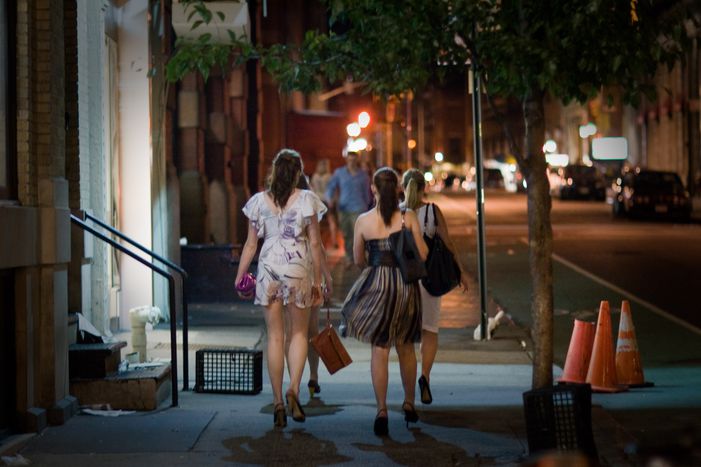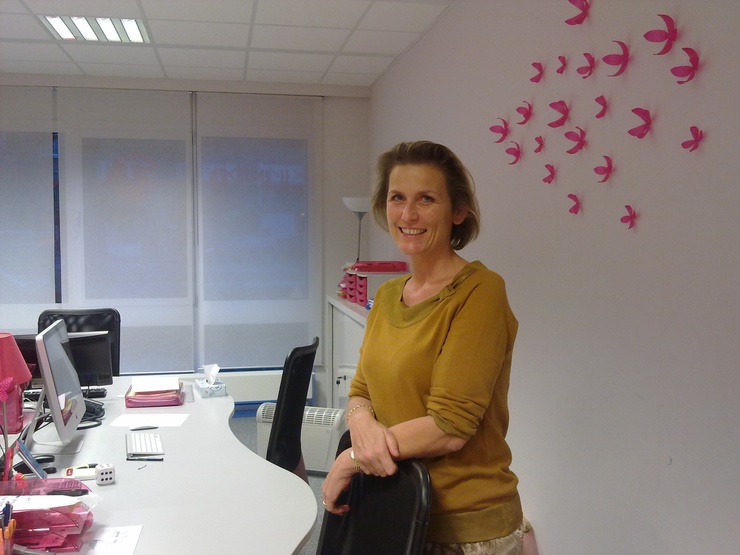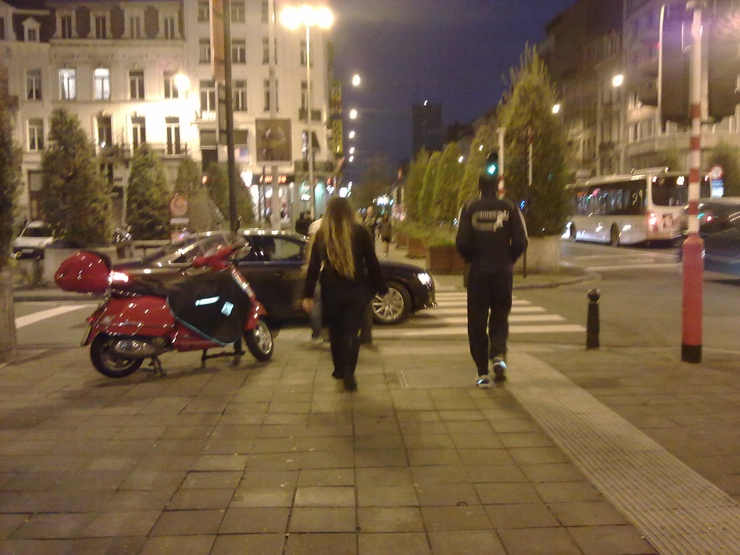
What it really means to wear a skirt on the streets of Brussels
Published on
Translation by:
GilheanAs Sofie Peeters walks the length of boulevard Lemonier in the Belgian capital, she is showered with insults and improper suggestions. The ensuing documentary which captured such moments caused an internet frenzy. Islamist groups came hot on the heels of the initial reactions from feminist organisations, after the racial origins of the gallant gentlemen in question were revealed.
Once the cameras are turned off however, how safe are the streets of Brussels for young women?
Brussels is the capital of a country which comes sixth worldwide for the highest number of recorded rapes, and where 26 out of 100, 000 women have been a victim of sexual violence. What does it really mean to wear a skirt in Brussels? First there was the twenty-five minute documentary by Sofie Peeters, where the Belgian film student filmed herself being cat-called with comments mostly of a sexual nature on a quiet, sunny day in Brussels: 'Hotel, bed, now..'. 'Wow, what an ass.' 'Dog.' 'Whore'.
The insults were spoken right in her ear, in broad daylight. The faces of the men were blurred but would still be recognisable to family or friends. The video was circulated by mass media. Sofie Peeters received threats from an islamist group called sharia4Belgium, which has since disbanded. In an interview she declared that '95% of the harassers' were of Arab origin - disappearing off the radar for journalists after that.
Now
It's late October in Brussels. People make their way to work on a sunny Friday morning on boulevard Lemonier. The street where Sofie Peeters filmed Femme de la rue is in the Annessennes area of Brussels and links Midi train station to the city’s Northstation. Before, most of the immigrants here were from Latin America; nowadays the majority of immigrants come from Maghreb countries. Arab pastry shops, muslim bookshops and halal fast food restaurants line the street. There are very few women to be seen but plenty of men stroll slowly along both sides of the street. ’The real city starts there, where the stock exchange is,’ says Daniel, a Romanian immigrant who sits next to me at breakfast. When I ask him about girls being harassed on the street, he thinks I am looking for prostitutes. Once he realises what I am actually doing he is more than willing to talk. I quickly realise that this is a ‘difficult’ area of the city. ’They put everyone here,’ says Daniel, referring to Arab immigrants. ’They call it integration.’
‘In this area there are much more serious problems than Sofie Peeters’ behind,’ says Linda Mondry, an independent journalist who runs a French-language blog called Coming Out. ’Because I am not a ‘powerful’ journalist, people agree to talk to me on the blog,’ she continues. ‘Sofie is young and her work was immature. When you explain that you are not a prostitute and you reply to people without being afraid, they stop harassing you. Young people from well-off areas come here at night to get drunk. Since they banned smoking in public places, everyone finds themselves out on the street together, rich and poor side by side. That’s what sparks the fighting. What do you think employers do when you say you are from Annessennes? They strike you off their list.'
Men's view
Brussels feels like a different world, one that is light years away from that of the European institutions, and where poverty, boredom and unemployment rule the roost. ‘I’ve never seen any girl being harassed,’ says Abdel, a Moroccan fellow I meet on the steps outside the stock exchange in the heart of the city. He offers to walk with me to show me how immigrants really live. ’The street changes character from day to night, but none of my female friends have ever been harassed,’ swears Bilal, a young sales assistant at Ar-Rissala bookshop.
'It’s dangerous here if you are young and wear a skirt, but it’s even worse in parts of Ixelles'
'It’s dangerous here if you are young and wear a skirt, but it’s even worse in parts of Ixelles,' explain Chantal and Justine, who are sitting at the bar of a fast food restaurant. I meet Charlotte, Aurélie and Lisa here, who go to the Francisco Ferrer university college next door. The 19-year-olds are not afraid of being harassed but prefer to go about in groups late at night. ‘Someone pushed me on my first day at college,’ says one of the three girls. ‘It’s better not to dress too provocatively,’ adds another. The three girls are from outside Brussels, and believe that harassment is the result of poverty and social exclusion. So many women here have unpleasant stories to tell. Licia, 24,was called ‘whore’ whilst walking across the street. Chiara was ’spanked’ on the tram. ‘With more police around we would be less scared,’ she says. ’With age I learned to defend myself better,’ says Julia, 29. ‘When you are under 25 you try all the possible solutions: reply, dress differently, stay silent… but nothing works.’
Read 'Expats dating abroad? That’s Brussels for you' on cafebabel.com
Since the beginning of 2012 Brussels has also held its own version of the Hollaback campaign. Founded in New York in 2005, it was introduced to the Belgian capital by Angelika Hild, a German student who was doing an internship in the Belgian capital. ’After arriving in Brussels I very quickly had problems,’ she tells me in her living room. ’I was told I would get used to it, but I have the right to walk the streets just as any man does.’ The Hollaback website collects stories from girls who have been harassed on the streets. There is one condition however – any reference to the race or social class of the men is omitted. ‘Chalk walks’ are also organised on a regular basis. On these nighttime strolls groups return to the streets where woman have been harassed and mark them with chalk.

Peeters’ documentary does deserve credit for drawing attention to the work of anti-sexist organisations and their campaigns. ‘If you start worrying about how you dress, you will never stop being scared.’ says Isabella Lenarduzzi, patron of the awareness campaign ‘Don’t lay a finger on my friend’ (Touche pas à ma pote). ‘My father was an Italian immigrant so I have always fought for foreigners’ rights. Today though, so many children of immigrants are segregated in an area of Brussels which is not European. If their only model becomes the country (and culture) of their parents, they will grow up without adopting the fundamental principles of European society which include equality between men and women. For them, if you don’t wear a veil you are a whore. We need to stand by the sides of those who are fighting to be respected, starting with female immigrants of the second and third generations.’

We return to the scene of the crime. Chiara de Capitani, 24, has Italian parents and was born in Belgium. She agrees to take a walk down boulevard Lemonnier at seven in the evening. I follow her at a distance of ten metres. With the high street lamps the boulevard seems to have become a lot narrower than it was during the day and seems to stretch into infinity. Chiara walks at a normal pace. A man gets up from his table outside a bar, whispers something in her ear, laughing. I hold my breath. Nothing happens however and we carry on until the end of the street. Sitting on the steps of the stock exchange, Chiara says she felt ’calm’ during the walk, adding that she was ‘surprised’ that no one tried to harass her. ‘On the whole I was lucky, but I think it is also because I am quite sure of myself.’ Whilst I am writing down her account of the events, a man on a bicycle pulls up beside a girl sitting next to us. He screams at her angrily in his own language then quickly cycles off. No one around gives even the slightest bit of notice.
This article is part of the seventh edition of cafebabel.com’s flagship project of 2012, the sequel to ‘Orient Express Reporter II‘, sending Balkan journalists to EU cities and vice versa for a mutual pendulum of insight. Thanks to the folks from cafebabel Brussels
Images: main (cc) Vox Efx/ flickr; in-text © Jacopo Franchi/ videos: (cc) 'Femme de la rue'; (cc) Elle Belgique/ both via youtube
Translated from Una notte nel cuore dell'Europa: cosa significa essere donna a Bruxelles



